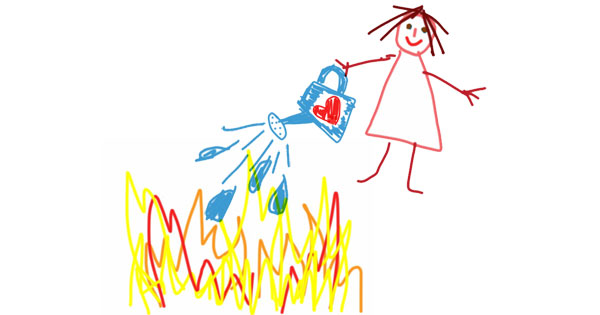
I was a morbidly fearful child. I was also a highly literate child, having learned to read before school years. My mother tongue is Mandarin, and the storybooks I consumed were Chinese folk stories. Some of them were harmless tales of developing moral character, but many recounted ancient Chinese myths of hell. In Chinese folk religion, hell consists of eighteen levels, each containing a specific type of torture reserved for corresponding sins. It is not a stretch to say that the images of hell I saw in picture books as a young girl impact me to this day. I was terrified.
Fast forward to my school-age years, when my parents sent me to a Christian school started by western missionaries, where I learned of the Jesus who could save me from hell. It was a no-brainer for me. I believed swiftly because I was deathly afraid of hell.
I have told this testimony many, many times throughout my growing up years in the Christian world. It was the ice-breaker to my testimony, the chuckle-inducing anecdote to begin a speech: “I accepted Jesus because I didn’t want to go to hell!” People would smile and nod with approval at my child-like faith. How did nobody tell me it was not funny?
Certainly, as I grew in cognitive and spiritual development, I learned there was more to the Christian life than an escape from hell, but once you begin a relationship with God based on fear it takes years to unlearn the image of the punitive God to be able to receive the heart of the gospel of grace. It was true for me.
Aside from universalists, most Christian traditions contain the doctrine of judgment, although the particulars of how that judgment is carried out varies along a spectrum. Whether it is actual physical torture for all eternity or some sort of separation from God, whether there’s purgatory or a second chance post mortem, there exists a form of judgment within the systems of Christian faith.
Good parenting sensibilities tell us we shouldn’t shy away from difficult truths, and although we try to be age-appropriate, we are obligated to share even the most unpalatable aspect of the Christian faith with our kids.
The problem is: children don’t yet have the emotional maturity and logical capability to process a belief in eternal punishment. Their budding minds can’t reason through the theological necessity of judgment in a loving God. So they panic and retreat into fear. In order to coax them out of their distress we comfort them: it’s okay, Jesus will save you, just believe in Jesus.
And so it begins, even as kids develop and eventually learn the nuances of Christian life, they are bearing the invisible baggage of fear that had them grasping for Jesus. The genesis of a relationship with a good and loving God is a child’s nightmare.
If we are really honest with ourselves, we plant fear into our children’s hearts because we have not yet uprooted fear from our own. We want our children saved because we are so afraid of what would happen if they are not.
Before we can raise our children un-fundamentalist, we must excavate the nasty enemy of fear from deep within our hearts and boot it for good. Despite strong Christian traditions on the doctrines of heaven and hell, the afterlife remains an unknown mystery. To tell children you know for sure what will happen is to to be dishonest, and to act, well, as a fundamentalist.
It is bad religion to scare children into conversion and to dictate their morality from the basis of fear.
A strong desire for our children to know God and follow God need not and should not come from a fear for their eternal destination. Spiritual security for our kids doesn’t mean an assurance they will escape the fates of fiery doom, it means providing security rooted in the love of God. Just as we do all we can to provide for the physical and emotional needs of our children, so we must give them this safe spiritual environment.
God loves you without condition. God will never leave your side. God delights in you. God is like the mother hen gathering chicks. God is like the forgiving father welcoming his prodigal son. God is like a warm fire on a cold night, bringing you comfort. God cares beyond what you can imagine.
God loves you. God loves you. God loves you.
This doesn’t guarantee the child will grow to believe in God. It doesn’t mean the hard conversations about suffering, judgment and injustice won’t be had when the child is old enough to tackle these issues. It does mean, however, that should they choose to live a life of faith, of belief in God, that it would not have come from a place of fear. Hopefully, it will mean they were compelled by the truths and love they witnessed in the lives of their parents, community, and the acts of God in the world.
When I was a young convert, having believed I was safe from hell because of a belief in Jesus, I remained terrified—because my parents had not yet become Christians. I spent agonizing hours praying desperately for them, willing there to not be an accident that took their lives before they converted. I wish I knew then what I know now, that the weight of the eternal damnation of my loved ones was far too heavy for my young, frail shoulders to carry. I wish I knew and believed God loves everyone, that we don’t know for sure what will happen after death, that choosing to love trumps fear.
I will not repeat this mistake with my children. I will not be afraid for their salvation. I am choosing to channel my childhood fears into a fierce force of love for them, in the best ways I know how.
And may they know that I have only ever been able to love them the way I do because the God who loves them so, also loves me.
 About Cindy Brandt
About Cindy Brandt
Cindy writes from Taiwan about faith and culture. She blogs at cindywords.com. She is the author of Outside In: Ten Christian Voices We Can’t Ignore, which you can download for free here.
Leave a Reply